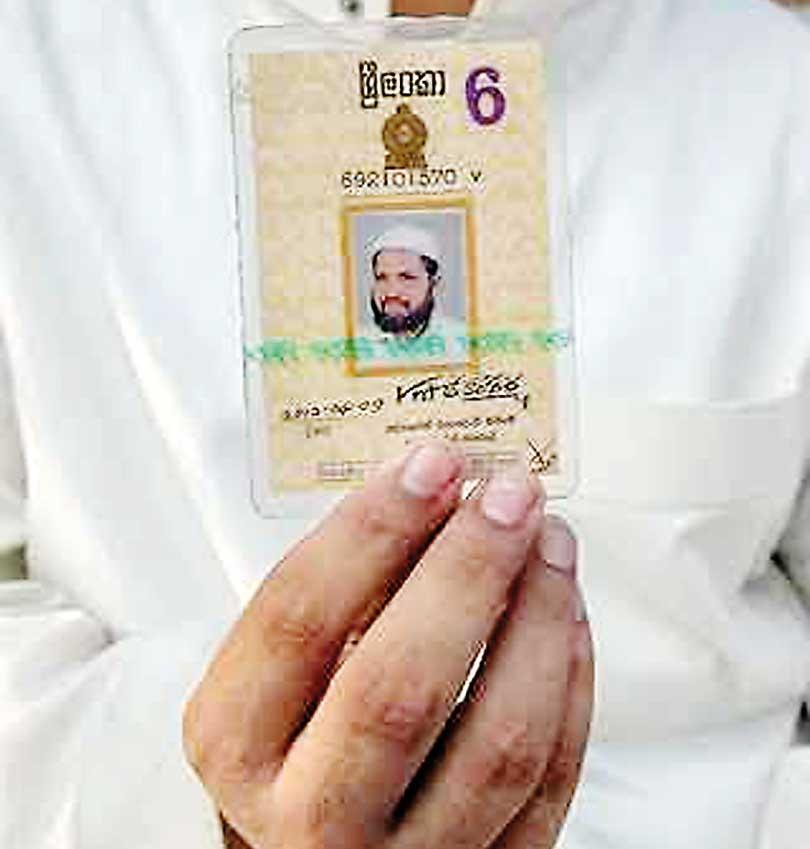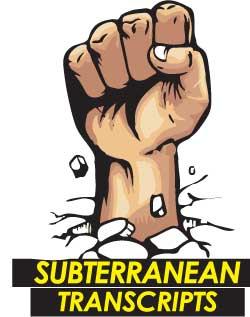Reply To:
Name - Reply Comment

M.S. Fouzul Ameen’s national identity card held by one of his sons
 M.S. Fouzul Ameen should have been alive today. The furniture shop owner from Kottaramulla, Nattandiya was killed by a mob on May 13, 2019. Many shops owned by Muslims should still be standing. They are not. No one should have or should show any apprehension of any Muslim, regardless of attire or appearance. Non-Muslims are wary and Muslims are apprehensive of one another. Should not be that way, but that’s what things have come to.
M.S. Fouzul Ameen should have been alive today. The furniture shop owner from Kottaramulla, Nattandiya was killed by a mob on May 13, 2019. Many shops owned by Muslims should still be standing. They are not. No one should have or should show any apprehension of any Muslim, regardless of attire or appearance. Non-Muslims are wary and Muslims are apprehensive of one another. Should not be that way, but that’s what things have come to.
After Fouzul Ameen was killed, a Facebook post with a picture of his ID card tagged to it, raised a question. (what can we do to stop the children of this man from becoming extremists — yes, the questions is for those who were demanding blood).
Legit. As legit as this response to the post: (Perhaps you couldn’t find IDs of those who the NTJ killed? Be consistent or be silent, they say).
Perhaps as response to the observation, a clarification followed: (This is what I wrote about those who died in the bomb attacks, ‘I am not safe, those who died are my people.’ I am not silent and I am convinced of my consistency.’ And here’s the response: ‘yßu ,hdkaú;hs fndaïnlreõka úYfhys Tn fldkaisiagkaÜ ke;.’ (Very tender are you with respect to the suicide bombers; consistent you are not.’
The violence in the North Western Province is unlike what we saw on Easter Sunday in that the latter was a product of long-term strategizing including the setting up of terrorist training camps, stockpiling arms and ammunition, and systematic indoctrination. But we can and should talk about the equivalencies.
The law enforcement authorities were clearly complicit in the case of the Easter Sunday attacks and in the mob violence led by people outside the particular areas that erupted three weeks later that took the life of Fouzul Ameen. Politicians offered support, direct or indirect, or were silently complicit. Theoretically, both could have been prevented provided warning signs noted, warnings heeded and relevant measures put in place.
Issues of identity marked both. In the one, terrorism for the purpose of faith-affirmation. In the other, the targeting of a community. In the one, some argue, the rise of a movement as response to existentialist angst. In the other, although the same people will not acknowledge, a similar angst, at least in the outward expression, never mind the clear hand of bankrupt politicians.
 The equivalency has been given credence by many commentators, mostly from Colombo’s Twitterati (aka Kolombians and Colombots) made up of Born Again Democrats and Funded Voices. The Easter Sunday bombs shocked them, naturally. So did the violence in the North Western Province. In the first case, they were quick to say ‘Terrorism has no religion’ (never mind that the terrorists were affirming a faith and not forgetting, following that logic, the fact that we have many religion-less mosques and Islamic educational institutes! In the latter case, the perpetrators were labelled: ‘Sinhala Buddhists’ (with or without the ‘extremist’ tag).
The equivalency has been given credence by many commentators, mostly from Colombo’s Twitterati (aka Kolombians and Colombots) made up of Born Again Democrats and Funded Voices. The Easter Sunday bombs shocked them, naturally. So did the violence in the North Western Province. In the first case, they were quick to say ‘Terrorism has no religion’ (never mind that the terrorists were affirming a faith and not forgetting, following that logic, the fact that we have many religion-less mosques and Islamic educational institutes! In the latter case, the perpetrators were labelled: ‘Sinhala Buddhists’ (with or without the ‘extremist’ tag).
Some, correctly, pointed out the long history of patriotism affirmed by Muslims. The names of officers who laid down their lives in the war against terror were mentioned. And yet, interestingly, the very same people who make this point also claim that ‘Sinhala Buddhist majoritarianism’ caused the war which, again they say, was fought by Sinhala Buddhists against Tamils! Strange.
Dr. Harsha De Silva went an extra mile, claiming that the Kuliyapitiya violence cost the economy more than the Easter Sunday attacks. Yes, ‘Doctor’ Harsha De Silva. Economist. Someone called Taylor Dibbert was more specific. He penned a piece for www.foreignpolicy.com titled ‘Buddhist anger could tear Sri Lanka apart’. At least he’s said out loud what the aforementioned twitterati only whispers in private. Yep. Buddhists are the villains of the piece. They are who could tear Sri Lanka apart. What that to-be-torn country is, of course, is up for debate.
For a long time, we have had this anti-Buddhist sentiment finding expression in various ways. It takes the form of advocating a secular state without mentioning history, without talking about all the privileges enjoyed by non-Buddhist religious fraternities (compared, for example, to what religious minorities enjoy in Muslim or Christian nations). Mangala Samaraweera and his ilk say ‘We are Sri Lankans’. Correct. But then again, why don’t this One Sri Lanka folk work tirelessly to advocate and constitutionally concretize the ‘One Nation, One Law’ thesis? Why not scream for the abrogation of customary laws?
But we are in a season of equivalency here and that calls for a vilification of Buddhists and of course Sinhala Buddhists. In the long history, we have had villainy. Magha of Kalinga: was he a Buddhist? The Portuguese who destroyed temples: were they Buddhists? The British who perpetrated genocide (a word oft mis-used by its users), ethnic cleansing and whose rule was marked by religious persecution and, again, the vandalizing of temples and kovils: Buddhists? Then there is the recent history. Velupillai Prabhakaran, goaded by Tamil racists: a Buddhist? The NTJ/ISIS: products of Buddhist extremism?
Back to equivalency. The Janatha Vimukthi Peramuna (JVP). They were quiet for three whole weeks and were quite shy about explaining off the fact that they entered the name of a top rung NTJ operative in their national list. Then, Kuliyapitiya happened. Then came the poster, condemning all extremisms. Correct. But late. And selective, strangely.
And now we have both the United National Party (UNP) and the JVP in navel-gazing mode regarding the vote of no confidence on Rishard Bathiudeen. We know the charges. We know that the near and dear, blood-wise, faith-wise and political loyalty wise, were right up there among the bigwigs of the NTJ terrorists. Sure, we can and should ask why a similar vote is not taken on Dayasiri Jayasekera for some actions that were similar to the lesser charges against Bathiudeen. That aside, it is nothing less than scandalous for Navin Dissanayake to say that the move on Bathiudeen is racist. That’s almost saying ‘if you are not a Sinhalese or a Buddhist and you engage in any kind of hanky panky, you get a wide berth because, well, you belong to a minority and therefore any action against you has to be racist.’
Last weekend we saw Muslims and Christians in their thousands celebrating Vesak. That’s not going to deliver reconciliation, but it will not hurt it either. Indeed, even though the gesture was warm and warmly received, I don’t think anyone should feel compelled to celebrate some other faith on account of penitence (on behalf of ‘nutters’ professing the same faith) or fear. I say this knowing well that many among them did it for reasons more wholesome than fear and which went beyond ‘penitence’. What is more important, and I believe it is happening in the Muslim community in a big way, is determined objection to all forms of teaching that buttress extremism of the kind we saw on Easter Sunday.
At a recent media conference, some Muslim leaders were outspoken about the need for the Muslim community to indulge in introspection. Ali Saby observed that a historic opportunity has arisen to reform Muslim Law and customs in Sri Lanka. I offer that this opportunity can be squandered by the equivalency hordes referred to above.
There are two ways to trip. One is to sweep the truth under the carpet. The other is to spin a web of lies or half-truths. Such things are not the preserve of any single community, religious or otherwise, of course, but the Equivalency Clowns are certainly doing it full time. Doesn’t help. If indeed we get to reconciliation and civilization it will not be because of them but in spite of them. We owe it to every single victim of the Easter Sunday attack and to the good furniture shop owner, the late M.S. Fouzul Ameen.